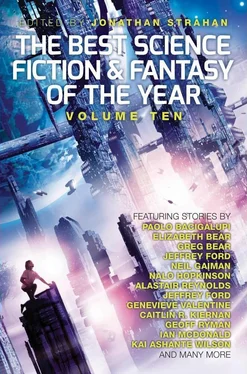She hoped that if she found a big settlement – the remains of one of their cities – she could prove this. And possibly even produce some clue as to what had happened to them all.
It wouldn’t be easy. A city buried under ten thousand years of sediment and jungle could go unnoticed even by an archaeologist’s trained eye and the most perspicacious modern mapping and visualization technology. And of course she had to be in the right place, and all she had to go on there were guesses – deductions, if she was feeling kind to herself, which she rarely was – about the patterns of relationships between those geologically active areas on Aphrodite and the aboriginal settlements nearby.
This is stupid. You’ll never find anything without support and an allocation. Kraken never would have pushed her luck this way.
Kraken never would have needed to. Dharthi knew better than anyone how much effort and dedication and scholarship went into Kraken’s work – but still, it sometimes seemed as if fantastic opportunities just fell into her lover’s lap without effort. And Kraken’s intellect and charisma were so dazzling... it was hard to see past that to the amount of study it took to support that seemingly effortless, comprehensive knowledge of just about everything.
Nothing made Dharthi feel the limitations of her own ability like spending time with her lover. Hell, Kraken probably would have known which of the animals she was spotting as she ran were new species, and the names and describers of all the known ones.
If she could have this, Dharthi thought, just this – if she could do one thing to equal all of Kraken’s effortless successes – then she could tolerate how perfect Kraken was the rest of the time.
This line of thought wasn’t helping the anxiety. She thrashed in the cocoon for another half-hour before she finally gave in and took a sedative. Not safe, out in the jungle. But if she didn’t rest, she couldn’t run – and even the Cytherean daylight wasn’t actually endless.
DHARTHI AWAKENED TO an animal sniffing her cocoon with great whuffing predatory breaths. An atavistic response, something from the brainstem, froze her in place even as it awakened her. Her arms and legs – naked, so fragile without her skin – felt heavy, numb, limp as if they had fallen asleep. The shadow of the thing’s head darkened the translucent steelsilk as it passed between Dharthi and the sky. The drumming of the rain stopped, momentarily. Hard to tell how big it was, from that – but big, she thought. An estimation confirmed when it nosed or pawed the side of the cocoon and she felt a broad blunt object as big as her two hands together prod her in the ribs.
She held her breath, and it withdrew. There was the rain, tapping on her cocoon where it dripped between the leaves. She was almost ready to breathe out again when it made a sound – a thick chugging noise followed by a sort of roar that had more in common with trains and waterfalls than what most people would identify as an animal sound.
Dharthi swallowed her scream. She didn’t need Kraken to tell her what that was. Every schoolchild could manage a piping reproduction of the call of one of Venus’s nastiest pieces of charismatic megafauna, the Cytherean swamp-tiger.
Swamp-tigers were two lies, six taloned legs, and an indiscriminate number of enormous daggerlike teeth in a four hundred kilogram body. Two lies, because they didn’t live in swamps – though they passed through them on occasion, because what on Venus didn’t? – and they weren’t tigers. But they were striped violet and jade green to disappear into the thick jungle foliage; they had long, slinky bodies that twisted around sharp turns and barreled up tree trunks without any need to decelerate; and their whisker-ringed mouths hinged open wide enough to bite a grown person in half.
All four of the swamp-tiger’s bright blue eyes were directed forward. Because it didn’t hurt their hunting, and what creature in its right mind would want to sneak up on a thing like that?
They weren’t supposed to hunt this high up. The branches were supposed to be too slender to support them.
Dharthi wasn’t looking forward to getting a better look at this one. It nudged the cocoon again. Despite herself, Dharthi went rigid. She pressed both fists against her chest and concentrated on not whimpering, on not making a single sound. She forced herself to breathe slowly and evenly. To consider. Panic gets you eaten.
She wouldn’t give Kraken the damned satisfaction.
She had some resources. The cocoon would attenuate her scent, and might disguise it almost entirely. The adaptshell was somewhere in the vicinity, munching away, and if she could make it into that , she stood a chance of outrunning the thing. She weighed a quarter what the swamp-tiger did; she could get up higher into the treetops than it could. Theoretically; after all, it wasn’t supposed to come up this high.
And she was, at least presumptively, somewhat smarter.
But it could outjump her, outrun her, outsneak her, and – perhaps most importantly – outchomp her.
She wasted a few moments worrying about how it had gotten past her perimeter before the sharp pressure of its claws skidding down the ripproof surface of the cocoon refocused her attention. That was a temporary protection; it might not be able to pierce the cocoon, but it could certainly squash Dharthi to death inside of it, or rip it out of the tree and toss it to the jungle floor. If the fall didn’t kill her, she’d have the cheerful and humiliating choice of yelling for rescue or wandering around injured until something bigger ate her. She needed a way out; she needed to channel five million years of successful primate adaptation, the legacy of clever monkey ancestors, and figure out how to get away from the not-exactly-cat.
What would a monkey do? The question was the answer, she realized.
She just needed the courage to apply it. And the luck to survive whatever then transpired.
The cocoon was waterproof as well as claw-proof – hydrophobic on the outside, a wicking polymer on the inside. The whole system was impregnated with an engineered bacteria that broke down the waste products in human sweat – or other fluids – and returned them to the environment as safe, nearly odorless, non-polluting water, salts, and a few trace chemicals. Dharthi was going to have to unfasten the damn thing.
She waited while the swamp-tiger prodded her again. It seemed to have a pattern of investigating and withdrawing – Dharthi heard the rustle and felt the thump and sway as it leaped from branch to branch, circling, making a few horrifically unsettling noises and a bloodcurdling snarl or two, and coming back for another go at the cocoon. The discipline required to hold herself still – not even merely still, but limp – as the creature whuffed and poked left her nauseated with adrenaline. She felt it moving away, then. The swing of branches under its weight did nothing to ease the roiling in her gut.
Now or never.
Shell! Come and get me ! Then she palmed the cocoon’s seal and whipped it open, left hand and foot shoved through internal grips so she didn’t accidentally evert herself into free fall. As she swung, she shook a heavy patter of water drops loose from the folds of the cocoon’s hydrophobic surface. They pattered down. There were a lot of branches between her and the ground; she didn’t fancy making the intimate acquaintanceship of each and every one of them.
The swamp-tiger hadn’t gone as far as she expected. In fact, it was on the branch just under hers. As it whipped its head around and roared, she had an eloquent view from above – a clear shot down its black-violet gullet. The mouth hinged wide enough to bite her in half across the middle; the tongue was thick and fleshy; the palate ribbed and mottled in paler shades of red. If I live through this, I will be able to draw every one of those seventy-two perfectly white teeth from memory.
Читать дальше












